第六讲:句法翻译
句法翻译
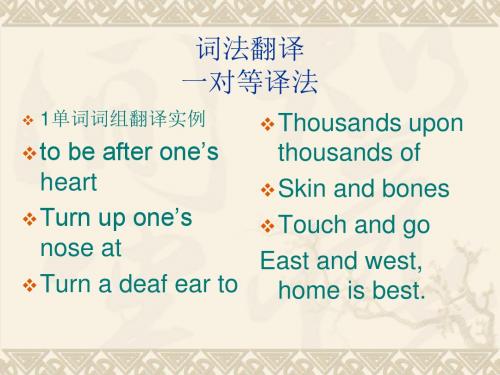
He witnessed ①the sixth②postwar③ ecnomic crisis ④of serious consequence ⑤in the USA. 这三个县经历了①那场②中国③七十年 代④第四次⑤极为严重的⑥遍及数省的⑦ 自然灾害.
二断句译法 It is certain that man will eventually solve the riddle of UFO.(拆开名词从句) Three rains has passed and it was that lean season when the villages store of grain and other dried foods from the last harvest as almost gone. (拆开定语从句) Afer singing a concert in the city, he said he wanted to greet his admirers.(拆开壮语从句)
他每天都要处理很多棘手的问题. He has many hot potatoes to handle everyday. 他新雇来的用人懒得出奇,饭量倒很大,真是个无用而累赘的 东西. His new emplyed servant was lazy and eats a lot,no more than a white elephant. 这个男孩真粗心,他的书已经折角了. The boy is too careless,all the books are dog -eared. 你不要过早乐观. Don’t count the chikens before they are hatched.
汉译英:句子的翻译说课讲解

3 增补主语 :两个原则必须遵循,一是要推敲语境;二是 要考虑英语语法习惯和行文的需要。
持续下了几天雨,郊区的道路境况极坏。
The roads in the suburbs are very bad。owing to the continual rainy days.
四、翻译中的主与次
(二)汉语流水句的翻译 流水句是一种无关联词的复句,其特点是“在非终句段出现句
终语调,语义联系比较松散,句段之间难以补上关联词”(《中译 英技巧文集》第282页)。这些句子有的着重动词,即多个动词连用, 有的着重名词,即以名词为重点。例如: 紫鹃答应着,忙出来换了一个痰盆儿,将手里的这个盆儿放在 桌子上,开了套间门出来,仍旧带上门,放下撒花软帘,出来叫醒 雪雁。(《红楼梦》) 这是比较典型的流水句,事情逐一交代,层层铺开,如何英译 呢?请比较下述两种译文: 译文I:Zijuan was answering and hurried out。to change a spittoon and put the spittoon in her hand on the table and opened the door of inner room to go out,still closed it,let down the flowered portiere and went to wake Xueyan. 译文Ⅱ:Zijuan,assenting,hurried out to fetch a clean spittoon,placing the used one on the table in the outer room.Having closed the door behind her,she let down the soft flower portiere before going to wake Xueyan.(摘自杨自 俭“小议汉语几类句子的英译”)
翻译技巧:句法翻
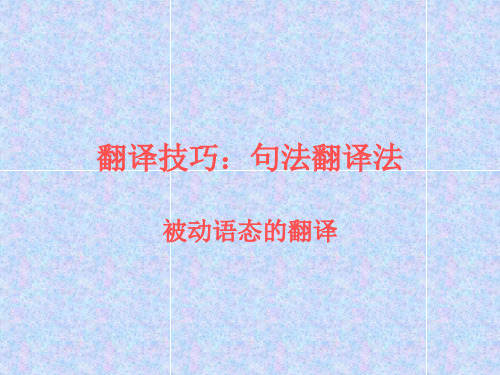
二、译成汉语无主句
• Measures have been taken to prevent the epidemic from spreading quickly. • 已经采取了措施来防止这种流行病迅速蔓延。 • Water can be shown as containing impurities. • 可以证明,水含有杂质。 • The unpleasant noise must be immediately put an end. • 必须全部停止这种讨厌的噪声。
• I finished my task just now. • My task was finished just now (by me).
• The farmers plant many apple trees there. • Many apple trees are planted there (by the farmers).
四、译成汉语被动句
• 使用“被、受、遭、让、给、由、把、得到、受到、加以、得以、 为...所、由...来”等等。 • The minister was found to have appropriated government money. • 部长被发现挪用公款。 • He had been fired for refusing to obey orders from the head office. • 他因拒绝接受总公司的命令而被解雇了。 • The schoolboy was knocked down by a minibus when crossing the street. • 那名男生在穿过街道时让一辆小公共汽车撞倒了。 • He was praised by his teacher. • 他得到了老师的表扬。 • Problems should be resolved in good time. • 问题应及时加以解决。
句法翻译ppt课件

• Advertising is often the most
__e_f_f_e_c_t_iv_e_ method of promotion.
• 节水型城市
• a water- __e_f_fi_c_ie__n_t_city
• 我们相信核能是当代最伟大的 发明之一,但是我们也担忧核 能会带来世界末日。
15
• Science is often referred to as a double-edged sword, increasing our wealth and comfort while leaving people in fear of potential dangers like human cloning.
• 主语过长:把主语变成 句子,加一个代词 (教 程p 98)
25
教程p.98
• Contribute to 促成 • Various factors contributed to the
economic crisis. • Keep the spirit alive 使…精神长盛不衰 • 两个并列主语: • The expense of … and the tradition of … • 请人做家务或干诸如油漆和木工这样的技
upon by all with a sense of decency. • 这种行径必定为所有有良知的人所 蔑视。
5
2. 省略法
• 采用原主语,省略被动词源自(受动者和动词可以直接构成主谓关 系结构。)
• The risk of global nuclear conflict has been greatly reduced. (97.3)
句法翻译法

句法翻译法第一节名词性从句的翻译一、主语从句1、以what, whatever, whether, when, where, how, why等引导的主语从句,在翻译的时候,一般可以按照英语原文顺序来翻译。
(顺译法)What he told me was only lie.When we can begin the journey is still a question.Whatever is worth doing should be done well.Whether he comes or not makes no difference.2、用it作形式主语的主语从句,可以把主语从句放到汉语句子的最前面翻译。
为了强调,it一般可以译出来, 翻译成“这”;如果不需要强调,it也可以不译出来, (但一定要采取颠倒语序倒着翻译!!!)It doesn’t make much difference whether he attends the meeting or not.It seemed unbelievable that the pilot could have survived the crash.题注:有时候,如果主语从句仍然按照英语原来的语序翻译的话,it一般不需要翻译出来。
在汉语译文开始的时候,一般可以用“….的是”It is strange that she should have seen her own shortcoming.二、宾语从句1.用that, what, how, when, which, why, whether, if等引导的宾语从句,在翻译成汉语的时候,一般不需要改变它在原句中的顺序。
(举例)I told him that because of the last condition, I’d have to turn it down.Can you hear what I say?I don’t know that he swam across the river.I don’t know how he swam across the river.He has informed me when they are to discuss my proposal.2.用it作形式宾语的句子,在翻译的时候,that所引导的宾语从句一般可以按英语原文的顺序来翻译;it有时候可以不用翻译。
标准日语初级教程句法翻译第06课第06课
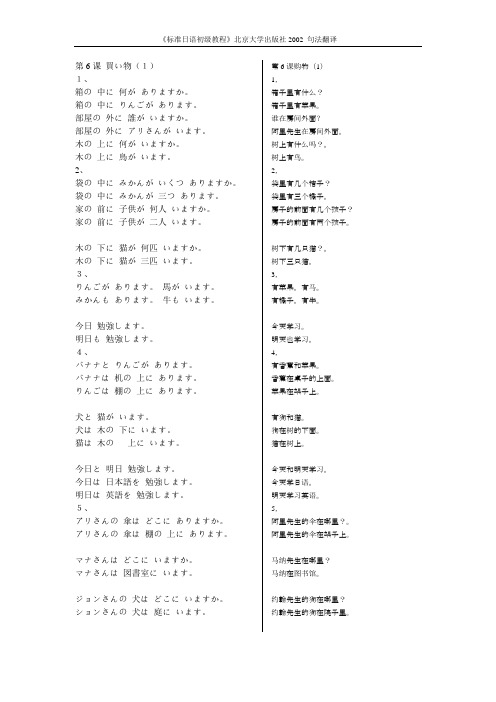
《标准日语初级教程》北京大学出版社 2002 句法翻译
第 6 课 買い物(1) 1、 箱の 中に 何が ありますか。 箱の 中に りんごが あります。 部屋の 外に 誰が いますか。 部屋の 外に アリさんが います。 木の 上に 何が いますか。 木の 上に 鳥が います。 2、 袋の 中に みかんが いくつ ありますか。 袋の 中に みかんが 三つ あります。 家の 前に 子供が 何人 いますか。 家の 前に 子供が 二人 います。
树下有几只猫?。 树下三只猫。 3, 有苹果。有马。 有橘子。有牛。
今日 勉強します。 明日も 勉強します。 4、 バナナと りんごが あります。 バナナは 机の 上に あります。 りんごは 棚の 上に あります。
今天学习。 明天也学习。 4, 有香蕉和苹果。 香蕉在桌子的上面。 苹果在架子上。
犬と 猫が います。 犬は 木の 下に います。 猫は 木の 上に います。
7, 椅子和桌子之间有什么东西吗? 不,什么都没有。 有谁在铃木先生的旁边吗? 不,谁也没在。 水池对面有什么吗? 不,什么也没有。 在这个百货商店买什么东西吗? 不,什么都没有买。 8, 一支圆珠笔是多少钱?。 圆珠笔是一根三百日元。
ボールペンは 三本 いくらですか。 ボールペンは 三本 九百円です。 9、 それは どんな はなですか。 これは きれいな 花です。 この花は きれい です。 ここは 静かな 部屋です。この 部屋は 静で す。 これは 丈夫な 箱です。 この 箱は 丈夫です。 今日は 暇な 日です。 今日は 暇な。 10、 宿題は 日本語だけですか。 いいえ、日本語だけでは ありません。英語 あ ります。
钱多吗? 没有,一点钱也没有。
7、 椅子と 机の 間に 何か ありますか。 いいえ、何も ありません。 鈴木さんの 横に 誰か いますか。 いいえ、誰もいません。 池の 向こうに 何か いますか。 いいえ、何も いません。 この デパートで 何か 買いますか。 いいえ、何も 買いません。 8、 ボールペンは 一本 いくらですか。 ボールペンは 一本 三百円です。
Lecture 6 句法翻译1
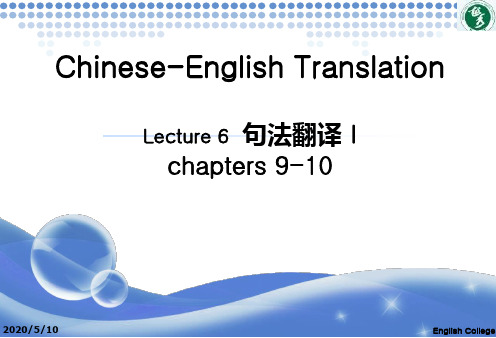
2011-5-4
4
English College
Try to translate the following sentences: 今天食堂吃饺子。
叉子吃不好吃筷子吧。
吃食堂味道不好。
2011-5-4 5 English College
到底 “谁” 吃“谁”?! 这种紊乱的施事(Agent Agent)与受事(Object Object)关系在 Agent Object 英语中简直是离经叛道,却在汉语里显得那么自然。 (今天食堂有 Jiaozi are served in the canteen today. ( 饺子吃) ) Eat with chopsticks if you can’t (do it well) with a fork. ( (用叉子吃不好就用筷子吃吧) ) The food served in the canteen doesn’t taste (在食堂吃的饭菜味道不好) good. ( ) 英语上述各句中的“吃”都隐含有逻辑主语(即施事 者)“人”,而原文句中的主语功能都变成了施事的 方式或场所。 2011-5-4 6 English College
2011-5-4 14 English College
2).问遍千家成行家。 Learn from numerous advisers , and you will become a master.
2011-5-4
15
English College
2.汉语的散点思维 2. 他有个女儿,在北京工作,已经打电话去了,听说明天就能回来。 , , , Version A :His daughter works in Beijing has been called, His and she would come back tomorrow. B:He Version B He has a daughter, working in Peking, who we have given a call and we hear of that she will come back tomorrow. 汉语句子变换了主语,并将其省略。补出主语后句子是这样的: 他有个女儿,(她)在北京工作,(有人)已经打电话去了,( 人们)听说(她)明天就能回来。 可以看出两例的译文基本没有摆脱原文形式的束缚,主语选择不 符合英语表达习惯。 It is heard of that his daughter who works in Beijing will come back tomorrow. 2011-5-4 16 English College
(完整版)翻译常用八大技巧
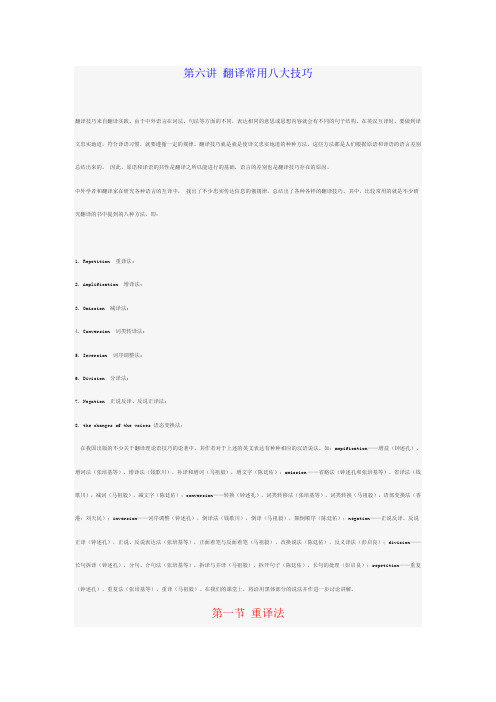
第六讲翻译常用八大技巧翻译技巧来自翻译实践。
由于中外语言在词法、句法等方面的不同,表达相同的意思或思想内容就会有不同的句子结构。
在英汉互译时,要做到译文忠实地道,符合译语习惯,就要遵循一定的规律。
翻译技巧就是就是使译文忠实地道的种种方法,这些方法都是人们根据原语和译语的语言差别总结出来的。
因此,原语和译语的共性是翻译之所以能进行的基础,语言的差别也是翻译技巧存在的原因。
中外学者和翻译家在研究各种语言的互译中,找出了不少忠实传达信息的俄规律,总结出了各种各样的翻译技巧。
其中,比较常用的就是不少研究翻译的书中提到的八种方法,即:1. Repetition 重译法;2. Amplification 增译法;3. Omission 减译法;4. Conversion 词类转译法;5. Inversion 词序调整法;6. Division 分译法;7. Negation 正说反译、反说正译法;8. the changes of the voices 语态变换法;在我国出版的不少关于翻译理论语技巧的论著中,其作者对于上述的英文表达有种种相应的汉语说法。
如:ampification——增益(钟述孔),增词法(张培基等),增译法(钱歌川),补译和增词(马祖毅),增文字(陈廷佑);omission ——省略法(钟述孔和张培基等),省译法(钱歌川),减词(马祖毅),减文字(陈廷佑);conversion——转换(钟述孔),词类转移法(张培基等),词类转换(马祖毅),语部变换法(香港:刘天民);inversion——词序调整(钟述孔),倒译法(钱歌川),倒译(马祖毅),颠倒顺序(陈廷佑);negation——正说反译、反说正译(钟述孔),正说、反说表达法(张培基等),正面着笔与反面着笔(马祖毅),改换说法(陈廷佑),反义译法(彭启良);division——长句拆译(钟述孔),分句、合句法(张培基等),拆译与并译(马祖毅),拆开句子(陈廷佑),长句的处理(彭启良);repetition——重复(钟述孔),重复法(张培基等),重译(马祖毅)。
- 1、下载文档前请自行甄别文档内容的完整性,平台不提供额外的编辑、内容补充、找答案等附加服务。
- 2、"仅部分预览"的文档,不可在线预览部分如存在完整性等问题,可反馈申请退款(可完整预览的文档不适用该条件!)。
- 3、如文档侵犯您的权益,请联系客服反馈,我们会尽快为您处理(人工客服工作时间:9:00-18:30)。
1. 英汉句法结构对比 2. 句法翻译技巧
英汉句法结构对比
英汉句子基本结构: 主语+谓语+宾语 虽然如此,但英汉句子结构在形式上有很多 差异,主要体现在句序和句子结构等方面。
句序的差异
A. 修饰语位置差异 英语的修饰语,如定语等,既可以置于被修饰语之前,又可 以置于其后。但若修饰语是短语或分句,如定语从句等,则 一般置于被修饰成分之后,称为后置。而汉语的修饰语,无 论是词,短语还是句子,一般都放在被修饰成分之前,称为 前置。如: 1. The son whom he had turned out had gone to a distant land, and his daughter was dead; so that there was no one left to help the old people. 被他赶走的儿子已远走他乡,女儿也去世了,所以没人能帮 助这两位老人了。
3. It suited their master to have them in his service, since the old people had been in authority themselves, and so knew how to do things. 因为老夫妇曾经是主人,知道怎么干活,所以穆罕
2. Then the guest called to the old woman who was seated behind the curtain: “ tell me, the old woman, what you think concerning the former happiness and your present misery.” 于是这位客人就大声询问坐在帘子后面的老
默德有他们服侍自己,感到称心如意。
4. Lencho showed not the slightest surprise on seeing the bills----- such was his confidence----- but he became angry when he counted the money… 蓝休看到钱一点都不感到惊讶-----他就是如此有信心 -----可是当他数钱的时候却生气了……
5. From this height one could see the river and, next to the corral, the field of ripe corn dotted with the kidney-bean flowers that always promised a good harvest. 从这个高度可以看到那条河,还可以看到畜栏旁那 片农田里长着成熟的玉米,菜豆花点缀其间,预 示着会有一个好收成。 6. Our reaction confirmed what we already knew: we are a people consumed by financial stress.
妇:“告诉我,你对以前的幸福生活和现在 的 悲惨境况有什么想法?”
B. 复合从句的语序差异
英汉复合句中主句和从句的顺序与汉语有较大的差 异。如时间状语从句可以出现在主句之前,也可其 后。而汉语则通常先发生的事先叙述,后发生的后 叙述;英语的因果状语从句也是如此,汉语则一般 是因在前,果在后。英语的条件从句也是如此,而 汉语也常常是条件在前,结果在后。
4) 发生了这样的事不是你的错。It’s not your fault that this has happened. (×That this has happened is not your fault. 这样翻译 过于正规,在文体上与原文不符。)(主语从句换序) 5) 她每天早上教我们学法语。She teaches us French every morning. (×She every morning teaches us French.)(状语换序) 6) 一直在一旁观看的小学生们开始鼓起掌来。The pupils that had been watching started to applaud. (×The always watching pupils started to applaud.)(定语从句换序)
汉语里,上下文的意思是理解的基础。如: 他不去我去。 假设关系: 让步关系: 转折关系: 因果关系:
假设关系:(如果)他不去,我去。 让步关系:(即使)他不去,我(也)去。 转折关系:他不去,(但是)我去。 因果关系:(因为)他不去,我去。 Translate the following sentences: 1. 今天食堂吃饺子。 2. 叉子吃不好吃筷子吧。 3. 吃食堂味道不好。
我们 ①为顾全大局 ②于同年 ③秋末 ④在第三方的调停下 ⑤开诚布公地⑥多次⑦强烈要求贵方赔偿我们的一切损失。 ④ With the third party acting as an intermediary, ①to take the interest of the whole into account, we ⑦strongly demanded ⑤with frankness and sincerity ⑥many times ③at the end of the autumn ②of the same year that you should compensate all our losses. (汉语原文状语的词序:☆主语、①目的状语、②时间状 语中的年份、③时间状语中的季节、④条件状语、⑤方式 状语、⑥频度状语、⑦程度状语、★谓语、◎宾语; 英语译文状语的词序:④条件状语、①目的状语、☆主 语、⑦程度状语、★谓语、⑤方式状语、⑥频度状语、③ 时间状语中的季节、②时间状语中的年份、◎宾语)
句子的表达
A. B. C. D. E. F. G.
英语重形合,汉语重意合。 英语主语突出信息焦点前置,汉语主题突出信 息焦点后置 英语常用无灵主语,汉语多用有灵主语 英语叙述多呈静态,汉语叙述多呈动态 英语组句多焦点透视,句式呈树式结构,汉语 组句多散点透视,句式呈竹式结构。 英语思维重逻辑,句式严谨规范,缺乏弹性; 汉语思维重语感,句式长长短短,灵活多变。 英语重时体,汉语轻时体。
随着中澳关系的发展,扩大贸易仍将是重要的, 相应地还要在一系列广泛的政治问题上展开密切 的联系。 注:译者恰当地把英语动词balance译成 “相应 地”,同时,把主句译成汉语的并列句。
较为复杂的换序译法: He witnessed ①the sixth ②post-war ③economic crisis ④ of serious consequence ⑤that prevailed in various fields ⑥in the USA. 他亲眼目睹了⑥美国②战后①第六次④后 果严重的⑤波及各领域的③经济危机。 (英语原文定语的词序: ①次第定语、 ②时间定 语、 ③本质性定语、★中心词、④判断性定语、 ⑤陈述性定语、⑥国别定语; 汉语译文定语的词序:⑥国别定语、②时间定 语、①次第定语、④判断性定语、⑤陈述性定语、 ③本质性定语、都这么你干你的,他干他的,爱来不来,爱干不 干,那怎么行呢? How can we get it done if you people all muddle along like this ( lazy away)?
由显变隐,由隐变显
9. The wind was so strong that he found it difficult to keep on his feet. 风太大了,他感到站都站不稳。 10. 他们进行挑衅活动,制造紧张局势,必须马上停 止。They must stop all their provocations at once, which create tensions.
吃饭,吃东西,吃醋,吃不开,吃香,吃官 司等如何翻译?
从英语和汉语的句法差异来看,主要有以下 常用的翻译技巧
一、换序译法 二、断句译法 三、转句译法 四、合句译法 五、缩句译法 六、转态译法 七、正反译法
一、换序译法
1) It’s good you're so considerate. 你想得这样周到是很 好的。(×这是很好的你想得这样周到。)(主 语从句换序) 2) Formerly a worker himself, he was now an engineer. 他 过去是工人,现在当了工程师了。(×以前的工 人,他是现在一个工程师。)(同位语换序) 3) On and on Byron talked. (Herman Wouk: The Winds of War) 拜伦滔滔不绝地讲述着。(×滔滔不绝地 拜伦讲述着。)(状语换序)
我们的反应也证实了我们已有的看法:我们是深受 经济压力折磨的人。
7. 我于冬日前去参观,但见衰柳寒烟,一水 茫茫而已。(沈复《浮生六记》) 译文1. I went there in winter, and could see nothing but unanimated trees and smokes. There is only a range of poor water. 译文2. I went there on a winter day and saw only a stretch of cold water against some sparse willow trees and a frosty sky. (林语堂)
As relations between China and Australia develop, the continuing importance of expanding trade will be balanced by the development of close contact over a broad range of political issues.
